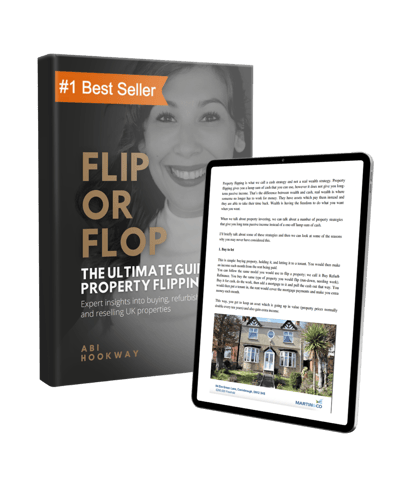A flipping strategy, also known as ‘fix and flip’, ‘property trading’ and ‘fix and sell’, is a property strategy which consists of buying below market value, renovating it to a much higher standard, and selling it on at profit within a few years.
Property flipping is the focal point of Homes Under The Hammer, one of the BBC’s most popular daytime shows which involves buying properties at auctions, renovating them, and either flipping them for profit or renting them out. The popular strategy aided by much-loved presenters has cumulated in an average 1.3 million viewers per episode.
There are huge profit gains that can be made from flipping property which is why it is a strategy that is loved by many. But there is more to it than is just explained on TV. This blog post takes a look at whether property flipping is the right property strategy for you.
Why do property investors choose a flipping strategy?
Property flippers can expect to make a profit of between 20% to 40% of the property’s value, minus what was spent on the refurb.
A typical project could involve buying a property for £150,000 and spending £30,000 on the renovation and the sale price could be £220,000 – meaning you’d make a profit of £40,000.
Fix and flip is a good strategy for novice investors because it allows them to acquire a lump sum of money in a relatively short space of time.
Who is a flipping property strategy ideal for?
This model isn’t perfect for everyone. But it does tend to work well for these purposes:
- You want to quit your day job quickly: Building a large enough buy-to-let portfolio to replace your income through rent could take years, but a couple of flip projects each year could replace your salary.
- You want to raise funds for buy-to-let deposits: Having enough deposit for one property isn’t enough for building a portfolio. If you use that cash to flip a property, the profit could be enough for a buy-to-let deposit and you’ll still have enough cash to flip again.
Advantages of property flipping
The traditional approaches involve buying a property for a low price, usually one that needs a lot of work or one that is greatly reduced because the owner is looking to sell quickly.
The refurb brings the property up to a higher standard and the refurbishment forces the property up to a higher standard. The refurbishment forces the property to appreciate which in turn increases the capital tied up in the property. You then sell the property for more than it was bought for.
If it is done right, it can provide a high return on investment (ROI) so it is a good way to make a lump sum quickly.
If you can refurbish the property quickly yourself or utilise your connections, it means the property can be improved at lower cost, generating higher returns.
If you’re flipping purely for re-sale, you don’t have any hassle such as managing tenants, maintaining the property long term or worry about the long term health of the property market.
Flipping houses does not require full-time attention so you can keep your day job and flip houses part-time to make extra money on the side.
It allows you to work from home. When you are just getting started you will likely be the only employee, so you don’t need to rent out an expensive storefront, office space or warehouse to manage your business. You can manage it all from the comfort of your own home.
It gives you the potential to be your own boss as many are self-employed. It gives you the potential to set your own hours, take holidays and have the flexibility to work from anywhere, giving you ultimate freedom to do what you love.
Compared to running a small business there are almost no start up costs. A small enterprise can involve the cost for purchasing franchise licenses, building a storefront and buying huge amounts of inventory or equipment. If you wanted to open a sandwich shop, you would have to build out a storefront, buy kitchen equipment, restaurant furniture and supplies, for example.
Flipping houses requires a relatively small amount of start up capital. There are also creative financing strategies for using little or no money to do this (as we’ll explain in our courses).
Flipping houses does not require any special licenses or degrees, but it does take a special mindset and a specific set of skills. It can help to have real estate or construction experience, but it is more important to have an ability to delegate tasks and the ability to focus on the areas of your business that you are good at and enjoy.
The strategy provides an amazing opportunity to build a legacy in the community. You can transform ugly, neglected and distressed houses into beautiful homes for new families to build memories and improve the quality of life on the street. It also increases property values in the neighbourhood, increasing community wealth and ultimately is reinvested into the local economy.
It also offers a fantastic opportunity for personal growth and development. Building a property business provides an incredible opportunity for you to learn, gain experience and grow on a personal level. As a business owner you will be in charge of managing and understanding all aspects of a business, meaning you can develop essential management experience and skills. By overseeing the rehab of your flip project, you will gain valuable experience and insight into all aspects of the construction process, methods, materials and more to help you to make money on future projects.
Is a flipping strategy right for you?
Many property flippers work with partners. One partner has the capital or time covered, while the other has the project expenses and the details covered.
Often beginners in property underestimate the time and money required while overestimating their skills or knowledge. Having a good judgement and realistic expectations are important before making large investment decisions.
What to consider when assessing flipping property potential
- Location, location, location
The neighbourhood makes a huge difference to the final selling price of a home.
Research is vitally important to ensure that going rates are realistically aligned with what you’re expecting to sell for.
You need to consider the target market in an area and what they want. What are the key factors that are on someone’s wishlist: a garden, off road parking and an ensuite? Though, if it is a high crime area, will this be top of someone’s priority list?
If you are going to flip a three-bedroom semi-detached house and are aiming to attract first or second time buyers, then amenities and infrastructure are going to be just as important as the actual property itself.
Consider the ease of access of getting to work and school. Is the property accessible by road, rail and bus without being beside a busy motorway. Location is a vital ingredient to getting a timely sale.
If you choose a property in an area perceived as undesirable, it is likely to stick longer than the worst house in the best street which has been brought up to standard.
2. Property Type
A two or three bedroom house will have universal appeal to a wide variety of buyers, whereas a seventh floor flat might be more niche. This could affect the amount of time you are holding the property, which in turn will affect your bottom line when you take into account council tax, water, electricity, gas and insurance.
Bungalows can also be a good type to flip if you can add genuine value through refurbishment or extension.
Most buyers will want a property that they can move straight into rather than improve over time.
3. Circumstance
The perfect storm is when someone needs to sell urgently, and you are able to act quickly.
Fast transactions will help you as a trader to secure your next project without a long chain, but also helps the vendor to move a property on and reduce their outgoings.
Often, there is valued to be added to properties that come to the market after someone has died, the owner is facing repossession, or the property has been tenanted for a long period of time and not maintained. Competition can be fierce for these details when they first come to market so don’t be tempted to go into a bidding war with inexperience people or those happy with less profit or those who may have made a mistake in their due diligence.
How to flip a property
When you’ve decided that property flipping is right for you, it is time to get started.
Before you go any further it is vital that you stock up on all the knowledge you can to execute a successful strategy.
Abi Hookway is an experienced property investor who now has a multimillion pound property portfolio.
At Touchstone Education we have a range of resources, property webinars and courses to enable you to make your first steps into flipping property.
The training set out over two days will teach you about the latest property strategies that are working, educate you in the different methods needed to get your property portfolio started and learn how to have greater diligence over your finances and manage yourself at a personal level.
To find out more information about any of our property courses call us on 01302 897131 or email office@touchstoneeducation.co.uk.
%20(1).png?width=600&height=215&name=gold%202%20(no%20shadow)%20(1).png)










